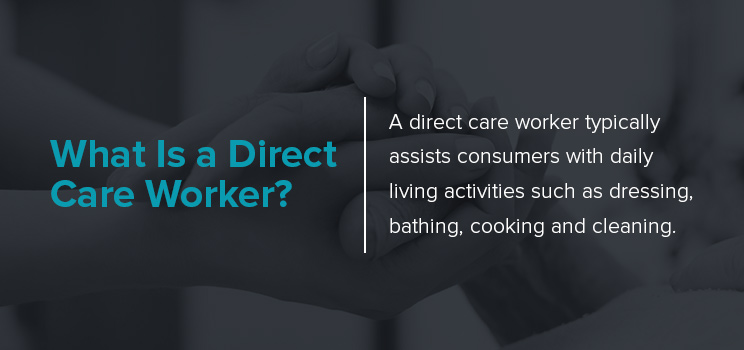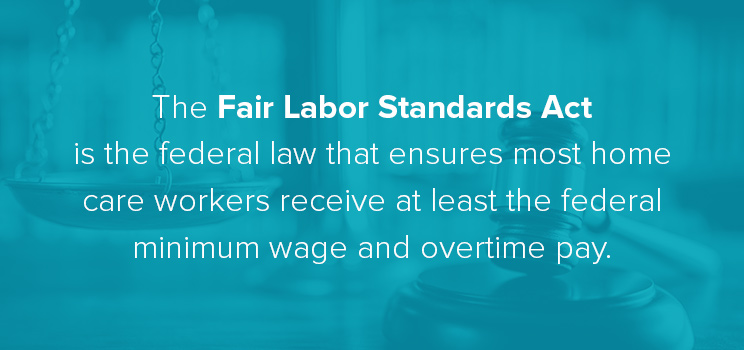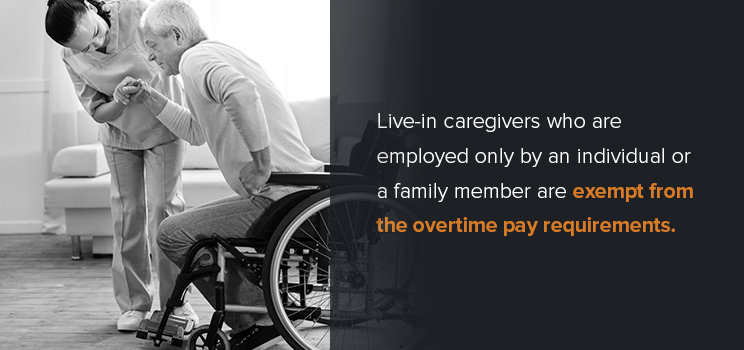By Larry Weisberg on November 19th, 2018
A career in the home health care industry is both rewarding and stable. According to the Bureau of Labor Statistics (BLS), employment for home health aides and personal care aides is expected to grow 41 percent by 2026 — much faster than other occupations.
If you work in home health care as a direct care worker, you know how important your job is. The individuals you care for depend on you to help them live and enjoy a higher quality of life. There are plenty of reasons to feel good about the work you do. However, despite the intrinsic reward of caring for individuals who need your assistance, you count on your job to support you and your family. You deserve fair compensation for the patience, compassion and skills you contribute every day you go to work. This includes overtime pay.
What are your rights as a home health care worker regarding overtime pay? We’ll explore the fair labor standards and how they apply to your career. Being a direct care worker is not an easy job, and your time is highly valuable. Caregiver labor laws make sure you are compensated for your time in the way you should be.
What Is a Direct Care Worker?
A direct care worker is another name for a home care worker. This means they work in a consumer’s home – not an outside facility like a nursing home or hospital. A consumer is an individual who uses the assistance of a home care worker. They may be a senior or have a physical or mental disability.
Several different job titles fall under the home care worker category, such as:
- Home health aide
- Personal care attendant
- Caregiver
- Certified nursing assistant (CNA)
- Direct care worker
A direct care worker typically assists consumers with daily living activities such as dressing, bathing, cooking and cleaning. Depending on their training, they may also administer medication or provide other health-related services. Direct care workers may live in or outside of a consumer’s home. In some cases, they may be a friend or family member of a consumer.
Direct care workers often provide companionship in addition to caregiving duties. If you work in the home health field, you probably know what it is like to help a consumer engage in their favorite hobby or pick out a new set of clothes. You may also take them into the community to enjoy spending time with their neighbors or peers. Many direct care workers agree that seeing a consumer smile is the most gratifying part of the job. Nevertheless, home health care workers face many challenges day-to-day.
One of the most significant challenges of working in the home care industry is accepting the wage. Home health care workers typically make an average of less than $11 an hour. One in four home care workers lives below the federal poverty line. This is also a challenge for consumers because low wages have led to a shortage of direct care workers. However, the growing demand for home health care workers has brought a change to caregiver labor laws. As you will see, staffing agencies must now pay direct care workers overtime pay and at least minimum wage according to the revised fair labor standards.
What Are Fair Labor Standards?
The Fair Labor Standards Act (FLSA) is the federal law that ensures most home care workers receive at least the federal minimum wage and overtime pay. The FLSA was created to protect employees from unfair compensation. Most direct care workers are protected under the FLSA. However, some workers are exempt from FLSA protections.
How Have Employment Laws for Care Workers Changed?
Before 2015, many direct care workers were denied the minimum wage and overtime pay protections under the FLSA. Initially, the act defined certain home health care work as providing “companionship services,” which was exempt from protection. This meant many workers were not being paid fairly despite the skills needed to do their job, and it also impacted the quality of care individuals received.
The Department of Labor (DOL) has since revised the FLSA regulations to narrowly define companionship and live-in service exemptions. Since January 1, 2015, direct care workers may be entitled to:
- No less than the federal minimum wage for all hours worked
- Overtime pay at 1.5 times their regular rate for all time worked beyond 40 hours in a workweek
Who Is Entitled to Minimum Wage and Overtime?
As a direct care worker, you are covered under the FLSA if any of the following apply:
- You are employed by an agency.
- Your employer is not the individual or household you assist.
- You perform medically-related services.
- You spend more than 20 percent of your workday helping a consumer with daily living activities such as dressing, driving, cooking or light housework.
- You perform duties that primarily benefit other members of the household, such as making meals for other family members.
Who Is Exempt From Overtime Pay?
Overtime exemption in the revised 2015 FLSA applies to fewer workers than the initial act. For example, if you work solely for a consumer or their family member, they may not have to pay you minimum wage or overtime pay if you mostly spend your time providing companionship. However, keep in mind that agencies or any third party employer must always pay the federal minimum wage and overtime pay. We will look at the exemptions in more detail below.
1. Workers Who Are Mostly Companions
The companionship services exemption still exists in the revised FLSA, but it is much more clearly defined in the updated version. The companionship services exemption generally applies to workers who mostly provide companionship rather than help with personal care or medical activities. As a direct care worker, you may be exempt from FLSA protections only if:
- You do not spend more than 20 percent of your total work time in a workweek assisting with daily living activities such as bathing, dressing and housework.
- You do not perform any medically-related services.
- You do not perform any housework for household members other than the consumer.
However, you should be compensated at least minimum wage and overtime pay if you spend more than 20 percent of your work time:
- Doing laundry
- Doing housework
- Driving a consumer to a doctor’s appointment
- Dressing the consumer
- Grooming the consumer
- Cooking their meals
- Bathing
- Treating a bruise
Here are a few examples of companionship services that are exempt from FLSA protections as long as you do not provide any medical services:
- Driving the consumer to go out for lunch
- Playing a board game with the consumer
- Watching TV with the consumer
- Going for a walk with the consumer
- Reading together
- Conversing
For example, if you are employed by a consumer and you spend one hour a week helping them do laundry and nine hours a week playing games together, they are not required to pay minimum wage and overtime pay because you spend less than 20 percent of your time assisting them with daily living activities.
However, if you provide companionship for the consumer and provide catheter care, you are protected under the FLSA because you are performing a medically-related service.
2. Family Members
If you are a direct care worker for a family member, you may be wondering if you are exempt from overtime laws. The law gets a little tricky when it comes to caregivers who provide care for family members. However, one rule to remember is this:
- If you are a consumer’s family member who is paid by an agency or funded program, you are protected by the FLSA.
With that said, the FLSA does not consider all time spent providing care for a family member part of the employment relationship. Usually, family members work with an outside program to develop a plan of care, or written agreement, which defines their employment relationship.
For example, if a plan of care authorizes Anne to care for her brother Bob for 40 hours a week, the agency who hired Anne must comply with the FLSA for the 40 hours she works. However, if Anne and Bob go out to dinner one evening and Anne helps Bob eat his meal, she cannot ask for compensation from her employer for assisting her brother at dinner. Her time out with Bob would be considered part of their familial relationship. However, if the plan of care states that one of Anne’s job duties is to assist Bob with dinner every night, and dinner happens to run late one evening, her employer may owe her overtime pay depending on their agreement.
If you are not sure what the rules are in a plan of care, ask your employer — you have a right to know. There should be a written agreement between you and your employer that explains the differences between employment time and familial time.
Non-relatives must be paid for all time spent providing services.
3. Live-In Domestic Service Employees
If you reside with the consumer you care for, meaning you work and sleep in their home, you are considered a live-in employee. Specifically, you are a live-in caregiver if you:
- Work and sleep at your employer’s home seven days a week
- Work 120 hours or more each week and work and sleep five days a week at your employer’s home
- Work and sleep five consecutive days at your employer’s home even if you do not work 120 hours a week
Live-in caregivers who are employed only by an individual or a family member are exempt from the overtime pay requirements. However, they must be paid at least minimum wage for all hours worked. On the other hand, live-in domestic service workers who are employed by a third party such as a staffing agency must be paid overtime by the third party — not the family. An employer and live-in worker will make an agreement which determines which hours count as work, and which ones do not, such as sleeping, mealtimes or personal hours.
If you work a 24-hour shift but do not reside with your employer permanently or for extended periods of time, you are not exempt, and you must be paid minimum wage and overtime pay.
How Do Employers Break Overtime Rules?
Third party employers, like staffing agencies, home care agencies or government agencies must pay all workers at least the federal minimum wage and overtime pay, even if they provide only companionship services or live-in domestic services.
In other words, agencies or any employer other than the consumer or consumer’s family must comply with the revised FLSA. This means that if you spend 60 hours a week playing cards with a consumer, your employer must pay you 20 hours of overtime pay, or 1.5 times your average rate.
Third party employers may not follow the rules established in the revised 2015 FLSA. Some employers make an honest mistake, in which case, you may be able to resolve the issue simply by pointing it out. Other times, employers are not aware of the rules, or they try to cut corners. Whatever the cause, if your employer does any of the following, you have a right to take action:
- Asks you to clock out when it’s time to travel between clients’ homes
- Does not pay you for taking a consumer on an errand or to a doctor’s appointment
- Does not pay you to assist a consumer aboard a flight during regular work hours
- Does not pay you for working while a consumer sleeps
- Pays your regular rate for overtime hours
- Does not pay overtime when your hours are split between different consumers but total more than 40 a week
- Does not pay you overtime pay for all hours worked over 40 hours
- Does not pay overtime for cooking for a client’s family members beyond work hours
- Does not keep an accurate record of your hours worked
- Does not pay you for taking a consumer shopping
If your employer has not paid you the money you’ve earned, you have a right to sue them or file a complaint with the DOL, because they violated federal law. They will have to pay you what they owe and possibly more such as interest on the unpaid wages, your attorney fees, and other penalties.
What If I Am Owed Overtime?
If you believe your employer has denied you overtime pay, you are not alone. Thousands of cases have been filed against employers since 2015 when the FLSA revisions went into effect. Employers face the challenge of keeping track of time in the complex world of home health care. They must consider paying or not paying for travel times, meal times and other activities that may or may not be part of the job. However, it is their responsibility to overcome the time-tracking challenge and accurately compensate you for every hour worked.
The employment lawyers at Weisberg Cummings, P.C. are here to help you recover the compensation owed to you. Each of our partners have experience handling complex cases in employment law. At Weisberg Cummings, P.C, we will work with you to determine if you have a case no matter how difficult the situation seems. We are committed to helping each of our clients reach a satisfactory resolution — and justice. Defend your rights as a home health care worker and take action today. For more information, give us a call or request your free consultation right here online.




